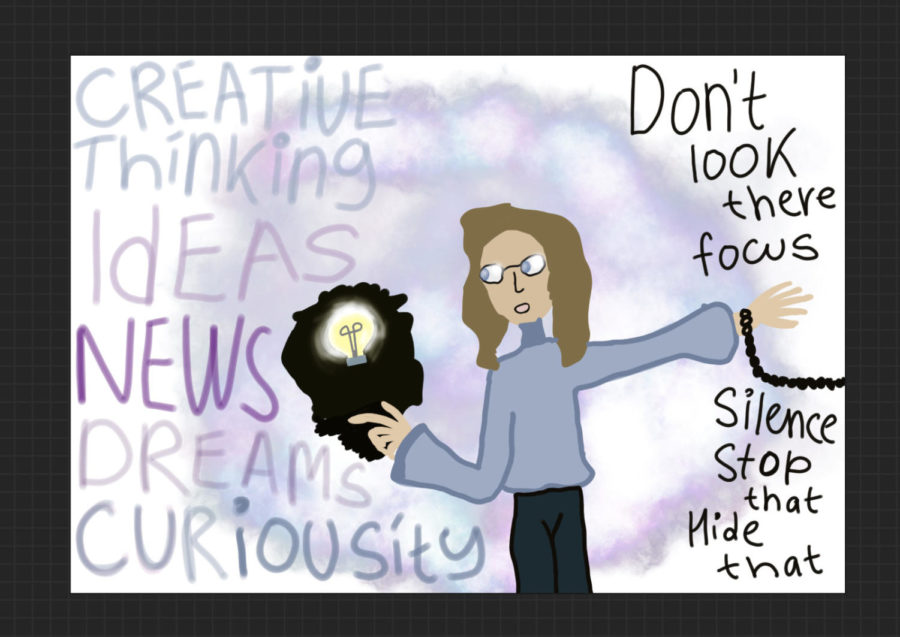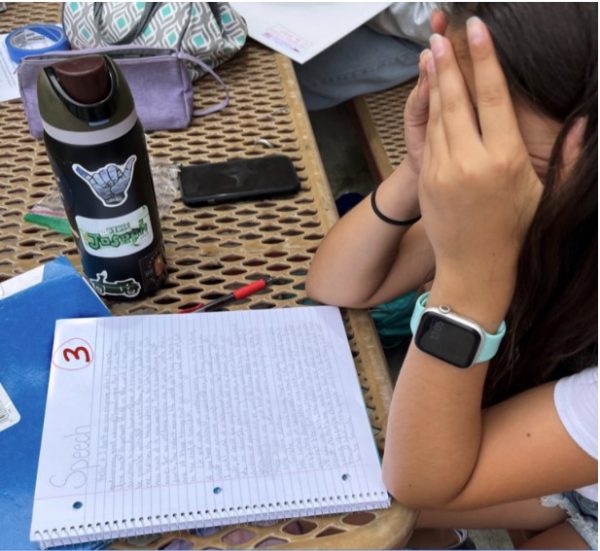The Education System Should Implement Artificial Intelligence in Schools as an Educational Resource
The education system should modernize by adapting to current artificial intelligence technology being developed
The negative mindsets that this person had gained while being trapped in our education system are holding her back from new discoveries
The modernization of the education system is vital in current-day society, as life outside of school is several steps ahead of learning in the classroom.
Recently, as artificial intelligence technologies have advanced and become more widespread, the Irvine Unified School District’s stance on the use of AI technology among students for educational purposes has been unclear. However, students do receive discouraging signs about using AI technology in school since students are unable to access the AI chatbot ChatGPT on school Chromebooks.
Sophomore Marleen Juarez expresses concern about AI technology being used in education.
“Many students are using [ChatGPT] to write their essays, and I don’t think that’s beneficial because the whole point is to learn necessary skills,” Juarez said.
The concerns revolving around AI technology in education often circle back to the point that students will become too reliant on the technology and not learn to do their own thinking. Although these worries are understandable, they do not fully consider the benefits of the education system modernizing and incorporating AI technologies.
For one, the United Nations Educational, Scientific and Cultural Organization exhibits hope in trying to use AI technology to make education more accessible to people. According to UNESCO, they are working toward using AI to help “[address] current inequalities regarding access to knowledge, research and the diversity of cultural expressions.”
This indicates how AI technology can help to extend the reach of education throughout the world, which is part of the Education 2030 Agenda.
Another benefit that AI technology can bring to education is that it can help to tutor students in need in creative ways that enhance the learning experience digitally. For example, Khan Academy is creating Khanmigo, an AI educational guide currently in development. Khanmigo will be able to teach students about history by acting as various historical figures, offer stimulating hints when students are struggling with math problems and aid teachers in creating lesson plans.
According to Salman Khan, the founder of Khan Academy, Khanmigo is being developed so that the benefits of AI technology can be incorporated into students’ education without exposing students to inappropriate information or leading them to use AI technology to cheat.
“[Students] can get help on problems that they might have to do in class or in homework, but once again, not in a way that it just gives them the answer, but in a way that a good tutor would do it. That it helps nudge the student for them to figure it out themselves,” Khan said.
This shows how the use of AI technology in education does not equate to a diminished learning experience or that students will rely on the technology instead of really learning. Khan elaborates on the potential Khanmigo has to engage and teach students, showing AI technology can be used in education without promoting academic dishonesty.
Despite the extensive potential of AI technology in education, it is still adapting for its use in education.
According to the Office of Education Technology, the way to use AI technology could be improved with input from educators in “national research projects focusing on emerging technologies for teaching and learning [where] educators are invited to participate in these projects.” This is a way educators can get involved in the usage of AI technology to ensure it will be safe and effective for use in education. Therefore, this AI technology has the opportunity to grow in its educational potential and better serve educators and students in schools.
With AI technology continuing to improve and with its potential to provide benefits for students and educators all over the globe, it should be more accepted in the education system.
UNESCO, the Office of Education Technology and Khan Academy all establish that AI technology has the potential to educate and yield valuable information for people, indicating it is a legitimate tool for people to learn, not something created to take away learning experiences.
As society progresses and develops new technology, schools should accept the changing times and incorporate helpful new methods of educating students.
Your donation will support the student journalists of Woodbridge High School. Your contribution will allow us to purchase equipment and cover our annual website hosting costs.

Hi Warriors! My name is Danbi Lee, and I’m delighted to be your Co-Editor-in-Chief this year! In my four years of journalism, it’s a continuous honor...

Hey, it's me Lisa. I am looking forward to a fun and creative year for Golden Arrow and making visuals for the newspaper. Things that inspire me are studio...









